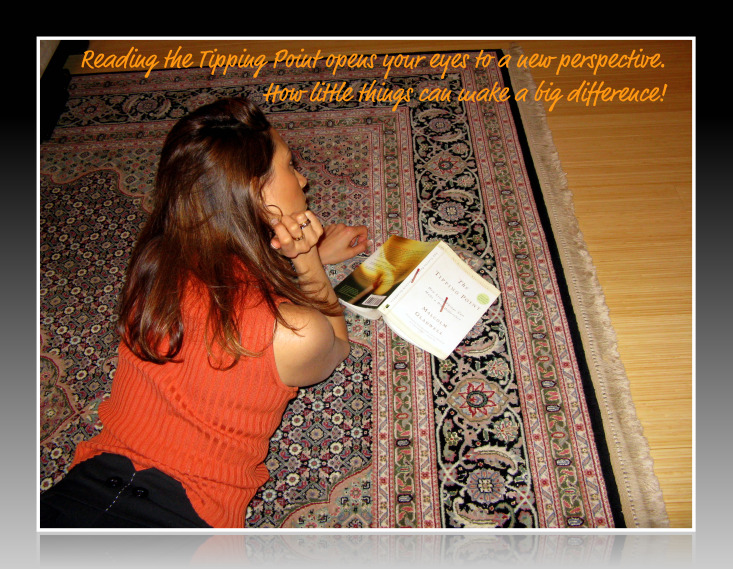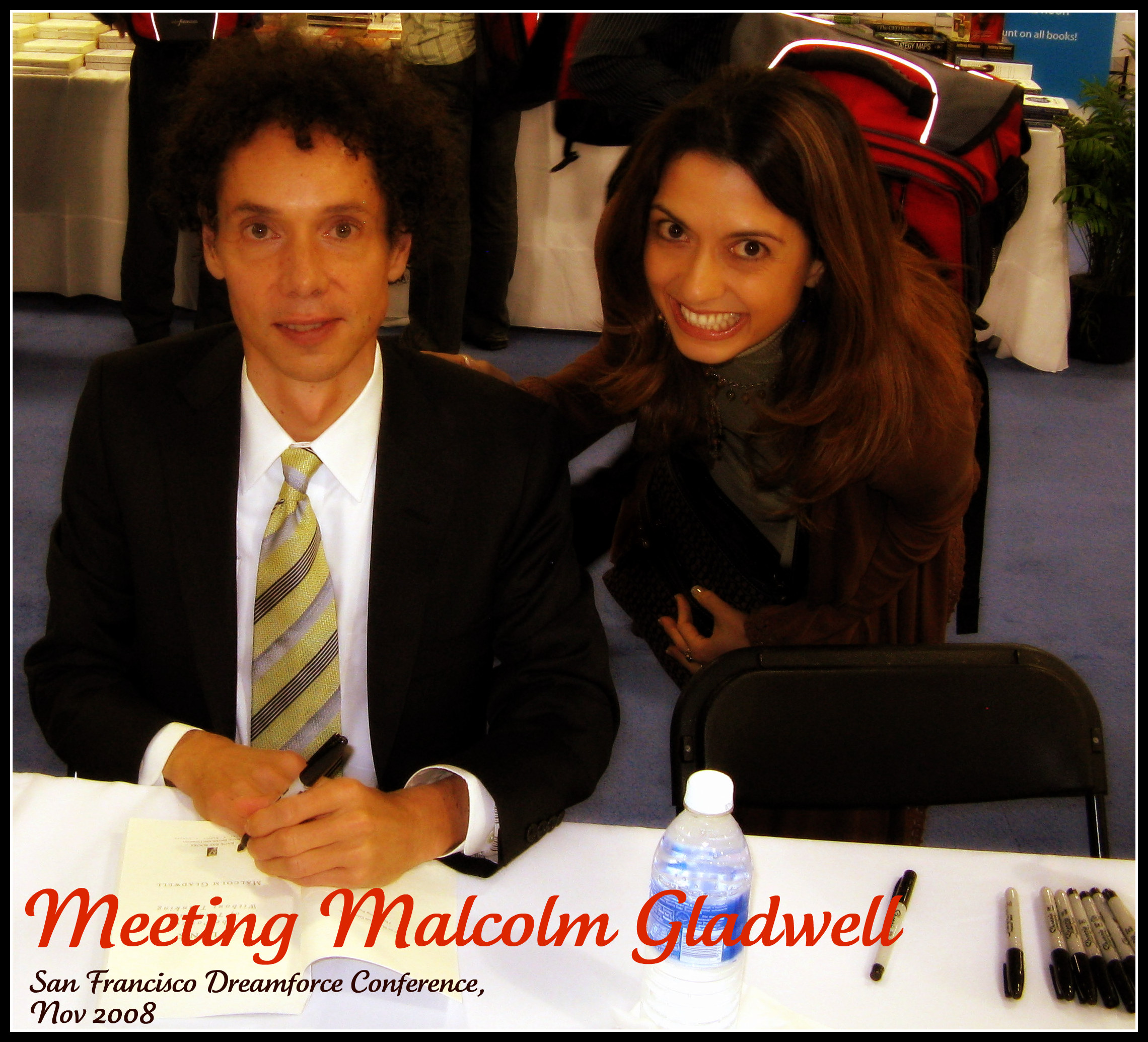
How do we reach the critical point in our endeavors where we can tip the scale of success to reach not just mediocre success but one of colossal size? How do some people reach success, wealth, fame of enormous proportions, while others just as likely, just as probable, barely tip that scale? What is the defining distinction between ideas and trends that take off while other similarly excellent ones are set aside, unnoticed? In Malcolm Gladwell‘s first major book, he defines The Tipping Point as that magical moment when ideas, trends and social behaviors cross a threshold and spreads like the flames of wildfire. He calls these ideas and social trends epidemics because they can spread like the flu! Gladwell takes us through these epidemics from their early beginnings to their pinnacle using several examples such as exponential rise of crime in large cities, rise of teenage smoking, seemingly overnight obsession with Hush Puppies shoes in the ’80’s, and many more. The trends can go in the right or wrong, good or bad direction. For instance, just as the epidemic of exponential crime rate can bring a large city down to its knees, small and precisely targeted activities can significantly drop crime rate; for this, he uses the example of NYC slumps and Rudy Juliani’s leadership in cleaning up the city in the 1980’s.
Gladwell’s writing style is easy-to-read, clean, intriguing, indicative of extensive research and analysis in his case studies, and captivating. While non-fiction, the small case-studies and stories behind each trend read like mini-thrillers; the suspense is brilliantly woven into the collection of facts. I enjoyed the author’s writing style immensely. His explorations into how small stuff explodes into huge phenomenon can attract any one of us because we can relate to this topic. Some of these examples may be obvious to average readers, such as the instant obsession with the Hush Puppies, and others are observations that make sense when the analysis is put forth such as the rise and fall of crime in NYC, and root cause of each trend. In all cases, we can relate to social psychology which is the study of our behaviors as individuals, as we fit into the larger piece of the puzzle, our society. For me, this was the first book that explored in this depth the social sciences of our society, and it did so supremely well because in addition to Gladwell’s excellent writing style, The Tipping Point tells stories about ordinary people with extraordinary lives, and that I find fascinating.
Reading is the best pastime for an active mind! If you like to see the other book reviews, check the index of Book Blogs.
The social epidemics explored in this book make me wonder about individuality, personal choice, and conformity. How does this factor into an epidemic of behavior? The subjects that Gladwell explores are interesting observations of trends and behaviors which take off by virtue of society’s copycat behavior. The Hush Puppies, for example, can only reach the phenomena they reached by society’s conformity to the fashion trend on a matter of complete personal choice, that of the brand of shoes. Certainly the quality of shoes has had a factor into their success, but the style of Hush Puppies can only appeal to so many people. Where does individuality and personal style fit in these epidemics when everyone follows a trend? I have never bought a pair of shoes because it is common and popular. I specifically stray from the common and typical to stand out, and the notion to stand out, I thought, seemed particularly strong among American teenagers. Does the social epidemic immediately imply conformity of society to trends?
In the other examples where the author explores the rise of crime, spread of syphilis and AIDS in inner-city slums, personal choice and smart decision-making is largely absent on a more serious matter. Poverty does not explain crime. Poverty does not and should not excuse crime. People always have and should feel and exercise personal choice, the choice to do the right thing, the smart thing. Nonetheless, the epidemics take off and explode. Therein lies the real sad truth in The Tipping Point.
Gladwell identifies 3 characteristics of epidemics: First, the contagiousness, second that small causes can indeed product big effects, and third, that change does not happen gradually; it happens at one single dramatic point – the Tipping Point. All three of these traits exist in the epidemics. The Tipping Point is intriguing in how it explores the epidemics from these angles; it is a great read. But it leaves you with want for more. It is meant for observation and it leaves me wanting to know how to create the next great epidemic, how to prevent a bad epidemic, how to build the seeds into the spread of a good epidemic and how to mitigate risk from a the spread of a bad epidemic. There are few answers for what could be the next behavior or trend in our social psychology, mostly the focus is on what has come and passed. In a book inspired by “The Tipping Point”, Made to Stick explores a more practical approach to how we can bring about stickiness to our own ideas, and while it is a well-written book, I would have loved Gladwell’s perspective.
In my favorite chapter, “The Law of the Few“, Gladwell takes us into the world of Connectors, Mavens, and Salesmen, and explores the unequal links in the concept of Six Degrees of Separation. He identifies these 3 types of people as critical players in the spread of social epidemics. They live and breathe among us and we should be aware of their role and understand the importance of how they impact these epidemics more largely than the average individual. He explains his perspective on the Six Degrees of Separation by this distinction: “That it does not mean everyone is linked to everyone else through just 6 steps. It means that a very small number of people are linked to everyone else in just a few steps, and the rest of us are linked to the world through those special few”. The Connectors are the social glue. Mavens are the data bank of information. Salesmen are the persuaders when we are not convinced of a particular opinion or trend. These are the key players in the Tipping Point phenomena.
Of all three, I aspire to live the life of the Connectors, those whose lives run in many varying social circles, and those whom everyone seems to want to know and be close to. Connectors attract the general population because of their network and their knowledge of these different social circles. Connectors turn the volume high on the word of mouth epidemic. In this manner, the Connectors give access to us into worlds to which we do not belong, and proximity to people whom we would otherwise not run across. While the average person would most likely run in one or perhaps two circles, the Connectors keep afloat a dozen circles, and do so not with difficulty, rather by feeding off the energy of one circle into another. Connectors love people of all kinds, and interest themselves immensely in business of knowing people.
Reading Gladwell’s book affirmed my innate behaviors of the need to belong to many social coteries. From professional corporate world to Toastmasters and public speakers, from yoga to Argentine tango to blogging communities, and from family and relatives in far away countries to countless friends and acquaintances all around me, these are some of the circles that I draw energy from, networks of people that I thoroughly enjoy participating in, and yet in no way, form or shape does it seem to stop there. I am forever pursuing new cliques to tab into and new connections to make. And you should too!

In November of 2008, at the Salesforce.com Dreamforce Conference in San Francisco, I met Malcolm Gladwell after his speech onstage. He was anticipating the release of his latest book, “The Outliers“, which is still sitting on my bookshelf, unopened at the moment. He delivered a powerful speech that day. His style of delivering his points on-stage combined with unique hand gestures and excellent vocal variety make him as strong a public speaker as he is an author. Above is where I meet him backstage at his book signing, very memorable for me.
Perhaps my only regret from The Tipping Point is the lack of practicality around how we can make these observations and discoveries useful, and apply them to our lives at a personal level, so that we can bring about our own social epidemics of success. Perhaps, I should have mentioned this to Malcolm when I met him, but I was far too excited to hear what he had to say, to make any such bold statements of my own.
 I am Farnoosh, the founder of Prolific Living. So glad you are here. My mission is to empower you to unblock your creative genius to live your dream life.
I am Farnoosh, the founder of Prolific Living. So glad you are here. My mission is to empower you to unblock your creative genius to live your dream life.